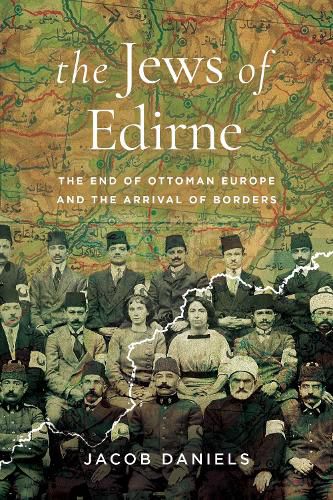Readings Newsletter
Become a Readings Member to make your shopping experience even easier.
Sign in or sign up for free!
You’re not far away from qualifying for FREE standard shipping within Australia
You’ve qualified for FREE standard shipping within Australia
The cart is loading…






At the turn of the twentieth century, the city of Edirne was a bustling center linking Istanbul to Ottoman Europe. It was also the capital of Edirne Province-among the most religiously diverse regions of the Ottoman Empire. But by 1923, the city had become a Turkish border town, and the province had lost much of its non-Muslim population. With this book, Jacob Daniels explores how one of the world's largest Sephardi communities dealt with the encroachment of modern borders.
Using Ladino, French, English, and Turkish sources, Daniels offers a new take on the ways in which ethno-religious minorities experienced the transition "from empire to nation-state." Rather than tracing a linear path, Edirne Jews zigzagged between the Ottoman Empire and three nation-states-without moving a mile. And by maintaining interstate Sephardi networks, they resisted pressure to treat the shifting border as a limit to their zone of belonging. Ultimately, proximity to the border would undo Edirne's Jewish community, but the way this ending came about-local Jews were rarely killed or deported-challenges common assumptions about state borders and Jewish history. By studying Jewish encounters with the nation-state alongside the emergence of modern borders, Daniels sheds light on both phenomena.
$9.00 standard shipping within Australia
FREE standard shipping within Australia for orders over $100.00
Express & International shipping calculated at checkout
At the turn of the twentieth century, the city of Edirne was a bustling center linking Istanbul to Ottoman Europe. It was also the capital of Edirne Province-among the most religiously diverse regions of the Ottoman Empire. But by 1923, the city had become a Turkish border town, and the province had lost much of its non-Muslim population. With this book, Jacob Daniels explores how one of the world's largest Sephardi communities dealt with the encroachment of modern borders.
Using Ladino, French, English, and Turkish sources, Daniels offers a new take on the ways in which ethno-religious minorities experienced the transition "from empire to nation-state." Rather than tracing a linear path, Edirne Jews zigzagged between the Ottoman Empire and three nation-states-without moving a mile. And by maintaining interstate Sephardi networks, they resisted pressure to treat the shifting border as a limit to their zone of belonging. Ultimately, proximity to the border would undo Edirne's Jewish community, but the way this ending came about-local Jews were rarely killed or deported-challenges common assumptions about state borders and Jewish history. By studying Jewish encounters with the nation-state alongside the emergence of modern borders, Daniels sheds light on both phenomena.